古英语文学
古英语诗歌 wanderer

古英语诗歌 wanderer
古英语诗歌《Wanderer》是一首十分著名的古老诗歌,它被认
为是英国文学史上最重要的作品之一。
这首诗歌大约写于公元10世纪,它以第一人称的方式描绘了一个流浪者的孤独和内心的痛苦。
诗歌中的主题围绕着丧失、孤独和生命的无常展开,同时也探讨了
人生的意义和价值。
《Wanderer》描绘了一个流浪者在世界上流离失所、孤独无助
的形象。
诗中通过描述流浪者在海上漂泊、在寒冷的天气里徒步行
走的景象,表现了他的孤独和无助。
诗歌中还包含了对丧失和死亡
的深刻思考,以及对过去时光的怀念和对未来的迷茫。
通过这些描写,《Wanderer》展现了人类对于生命中无法摆脱的痛苦和挣扎的
思考。
诗歌的语言使用古老的英语,这使得它的阅读和理解对于现代
读者来说可能有一定的困难。
然而,正是这种古老的语言和充满哲
理的内容,使得《Wanderer》成为了古英语文学中的经典之作。
它
的价值不仅在于其文学性,更在于它对人类心灵和生命的深刻触及。
总的来说,《Wanderer》是一首关于孤独、丧失和对生命意义
的思考的古英语诗歌。
它通过描绘流浪者的形象,表达了对人类存在的深刻思考,成为了古英语文学中不可或缺的经典之作。
英国文学各个时期的特点
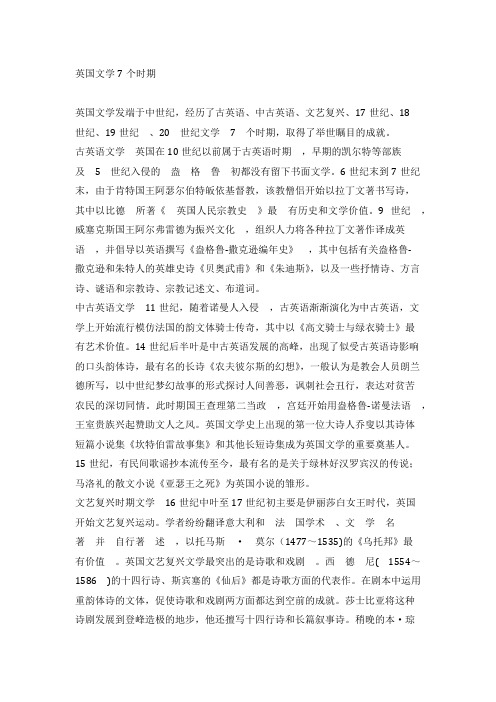
英国文学7个时期英国文学发端于中世纪,经历了古英语、中古英语、文艺复兴、17世纪、18世纪、19世纪、20世纪文学7个时期,取得了举世瞩目的成就。
古英语文学英国在10世纪以前属于古英语时期,早期的凯尔特等部族及5世纪入侵的盎格鲁初都没有留下书面文学。
6世纪末到7世纪末,由于肯特国王阿瑟尔伯特皈依基督教,该教僧侣开始以拉丁文著书写诗,其中以比德所著《英国人民宗教史》最有历史和文学价值。
9世纪,威塞克斯国王阿尔弗雷德为振兴文化,组织人力将各种拉丁文著作译成英语,并倡导以英语撰写《盎格鲁-撒克逊编年史》,其中包括有关盎格鲁-撒克逊和朱特人的英雄史诗《贝奥武甫》和《朱迪斯》,以及一些抒情诗、方言诗、谜语和宗教诗、宗教记述文、布道词。
中古英语文学11世纪,随着诺曼人入侵,古英语渐渐演化为中古英语,文学上开始流行模仿法国的韵文体骑士传奇,其中以《高文骑士与绿衣骑士》最有艺术价值。
14世纪后半叶是中古英语发展的高峰,出现了似受古英语诗影响的口头韵体诗,最有名的长诗《农夫彼尔斯的幻想》,一般认为是教会人员朗兰德所写,以中世纪梦幻故事的形式探讨人间善恶,讽刺社会丑行,表达对贫苦农民的深切同情。
此时期国王查理第二当政,宫廷开始用盎格鲁-诺曼法语,王室贵族兴起赞助文人之风。
英国文学史上出现的第一位大诗人乔叟以其诗体短篇小说集《坎特伯雷故事集》和其他长短诗集成为英国文学的重要奠基人。
15世纪,有民间歌谣抄本流传至今,最有名的是关于绿林好汉罗宾汉的传说;马洛礼的散文小说《亚瑟王之死》为英国小说的雏形。
文艺复兴时期文学16世纪中叶至17世纪初主要是伊丽莎白女王时代,英国开始文艺复兴运动。
学者纷纷翻译意大利和法国学术、文学名著并自行著述,以托马斯·莫尔(1477~1535)的《乌托邦》最有价值。
英国文艺复兴文学最突出的是诗歌和戏剧。
西德尼(1554~1586)的十四行诗、斯宾塞的《仙后》都是诗歌方面的代表作。
在剧本中运用重韵体诗的文体,促使诗歌和戏剧两方面都达到空前的成就。
1.1.古英语时期文学

Old English Literature(A.D.600-about A.D.1100)1.Historial background of this period and the evolution of the English language1. Historical background of this period and the evolution of the English languageBritain, the biggest of the British Isles, was originally inhabited by primitive Celtic tribes known as Britons. During this period, Britain was successively invaded by peoples from varying languages and cultures. Major invasions were made by the Romans, the Anglo-Saxons,and the Normans.Roman InvasionIn A.D.43, the Romans landed in Britain and made South Britain a Roman province. People in Britain had to pay tributes or taxes to the Roman Empire. But they still kept their language (Celtic) and their customs. The Romans ruled Britain for almost four centuries. In A.D.410, when the Roman Empire was declining, all the Roman troops went back to the continent to join the civil war there and never returned.Anglo-Saxon InvasionFrom the middle of the fifth century (A.D.449), three Teutonic groups (Angles. Saxons and Jutes) invaded the island from the regions of Denmark and the Low Countries (Holland, Belgium and Luxemburg). The Celts were driven westward to Wales and Cornwall. From the Anglo-Saxon conquerors came the name ‘England’ and ‘English’.The early Anglo-Saxons were heathen people. In A.D. 579, the Pope sent a Christian mission under Augustine from Rome. The missionaries were very aggressive and succeeded in converting English people to Christianity. By the end of the 7th century, all England had been Christianized.Early Anglo-Saxons spoke a language, which belongs to the Germanic language family and which is called Old English today. It is spoken from about A.D.600 to about 1100.Danish Invasion (from the late 8th century)Norman ConquestAfter the Norman Conquest by William the Conqueror in 1066, English as a language of a subjugated people underwent tremendous changes through contact with Norman French. The forwarding of stress brought about the loss of some of the old inflections. And the English vocabulary was gradually enlarged by borrowing and assimilating thousands of French, Latin and Greek words and words from many other languages.The English language had entered the second stage by 1100— Middle English (1100-1500), in its evolution from old English to modern English (from 1500 onward).2.Old English literature2.1. Old English PoetryMuch of the Old English poetry was intended to be chanted, with harp accompaniment, by Anglo-Saxon bard. Generally speaking, all the old English poetry that has survived can be divided into two groups: the religious and the secular.2.1.1 The religious groupThe religious group of poetry is mainly on biblical themes or on saints’ lives. Among them are Genesis A and Genesis B. Genesis B is concerned with the beginning of the world and the fall of the angels. It is a short piece of writing; the poet has thoroughly enjoyed describing God’s punishment of Satan and the place of punishment for evil in hell. Most of the long Genesis A is dull and little more than old history taken from the Bible and put into poor old English verse. Another poem taken straight from the bible is the well-written Exodus, which describes how the Israelites left Egypt2.1.2 The secular groupIn addition to these religious compositions, old English poets produced the national epic and a number of lyrical poem of short length, which do not contain specific Christian doctrines and which evoke the Anglo-Saxon sense of the harshness of circumstances and the sadness of human lot.Beowulf is the first great English literary work and is regarded today as the national epic of the Anglo-Saxons. I t is a folk legend brought to England by Anglo-Saxons from their continental homes. It had been passed from mouth to mouth for hundreds years before it was written down in the tenth century. The name of its author is unknown.Synopsis of BeowulfBeowulf is not about England, but about Hrothgar, King of the Danes, and about a brave young man, Beowulf, from southern Sweden, who goes to help him. His great hall, called Heorot, built for big gatherings and feasts with his followers, has been laid waste for twelve years by a monster named Grendel, which lives in a lake and comes to kill and eat Hrothgar’s men at night. One night Beowulf waits secretly for this thing, attacks it and in a fierce fight pulls its arm off.It is mortally wounded and manages to reach the lake again, but dies there. Then its mother comes to the hall in search of revenge, and the attacks begin again. Beowulf followed her to the bottom of the lake and kills her there. In later days Beowulf, now king of his people, has to defend his country against a fire-breathing dragon. He kills the animal but is badly wounded in the fight, and dies. The poem ends with a sorrowful description of Beowulf’s funeral fire.Stylistic features of BeowulfAlegdon tha tomiddes maerne theodenHaeleth hiofende hlaford leofneOngunnon tha on beorge bael-fyra maestWigend weccan wuwu-rec astahSweart ofer swiothole swogende legWope bewundenThe sorrowing soldiers then laid the glorious prince, their dear lord, in the middle. Then on the hill the war-men began to light the greatest of funeral fires. The wood-smoke rose black above the flames, the noisy fire, mixed with sorrowful cries.From the few lines above, we can see that:Each half line has two main beats.There is no rhyme. Instead, each half line is joined to the other by alliteration.Things are described indirectly and in combinations of words. For instance, a ship is not only a ship; it is a sea-goer, a sea-boat, a sea-wood, or a wave floater. If the poet wants to say that the ship sailed away, he may say “the ship, the sea-goer, the wave floater set out, started its journey and set forth over the sea, over the ocean-streams, over the waves.”4. As is known, the Anglo-Saxons were Christianized by the end of the 7th century. At that time few but monks could read and write, the earliest English books were written down by them. But as the monks hated the heathen books, they managed to tinge them with some Christian color which does not go in with the content of the whole thing.Major themes1.This epic presents a vivid picture of how the primitive people wage heroic struggles against the hostile forces of the natural world represented by Grendel, his mother and the fire-breathing dragon under the wise and mighty leader.2.The poem conveys a hope that the righteous will triumph over the evil. Beowulf stands for all that is good, brave and proper, while the monsters stand for evil.2.2. Old English proseOld English prose came later than Old English verse. The most interesting piece of prose is the Anglo-Saxon Chronicle, an early history of the country which begins with Caesar’s conquest and is a monument of Old English Prose. It is written under the encouragement and supervision of King Alfred the Great (849-899).Another important writer of prose was Aelfric (955-1025). His works were mostly religious. He wrote in English the meaning of the first seven books of the Bible. His prose style is the best in Old English. And he uses alliteration to join his sentences together.Literary termsepicalliterationrhymeEpic, in the form of a poem, refers to a long work dealing with the affairs and deeds of brave men, and focusing on the exploits and deeds of one man in particular, and is marked by what has been called ‘high seriousness’. (Beowulf has about 3,000 lines; Paradise Lost has 12 books. ) Homer (The Iliad and The Odyssey)) began the tradition of epic. The poet is not only writing to express his own thoughts or feelings, but the thoughts and feelings of some large group or community.Alliteration is the repetition of the initial consonant cluster in stressed syllables in a line. In English a syllable consists of three parts: an initial consonant cluster, a vowel or diphthong and a final consonant cluster. The initial consonant cluster is formed by 0,1,2, or 3 consonants.Speech is silver, silence is golden.Last but not leastHere in the long unlovely streetRhyme is identity of sounds between words or verse lines extending back from the end to the last fully accented vowel and not further. A rhyme word may have one, two or there syllables, though in practice rhymes of more than two syllables are rare in serious literature. Night/bright, care/fair, liquor/quicker, tenderly/slenderly, candy/dandy.End rhymes occur at the end of verse lines, while internal rhymes occur within the verse line. Half-rhyme is a kind of rhyme which is formed by repeating either the vowel or the diphthong or the final consonant cluster.Look at the following example below:Hope is the thing with feathersThat perches in the soul,And sings the tune without the wordsAnd never stops at all.Rhymes are arranged in a pattern within a poem. This pattern is called a rhyme scheme(押韵格式).Shall I compare thee to a summer’s day? aThou art more lovely and more temperate; bRough winds do shake the darling buds of May, aAnd summer’s lease hath all too short a date; bSometime too hot the eye of heaven shines, cAnd often is his gold complexion dimmed; dAnd every fair from fair sometime declines, cBy chance or nature’s changing course untrimmed. dBut thy eternal summer shall not fade, eNor lose possession of that fair thou ow’st; fNor shall death brag thou wander’st in his shade, eWhen in eternal lines to time thou grow’st: fSo long as men can breathe or eyes can see, gSo long lives this, and this gives life to thee. g。
英国文学各个时期流派
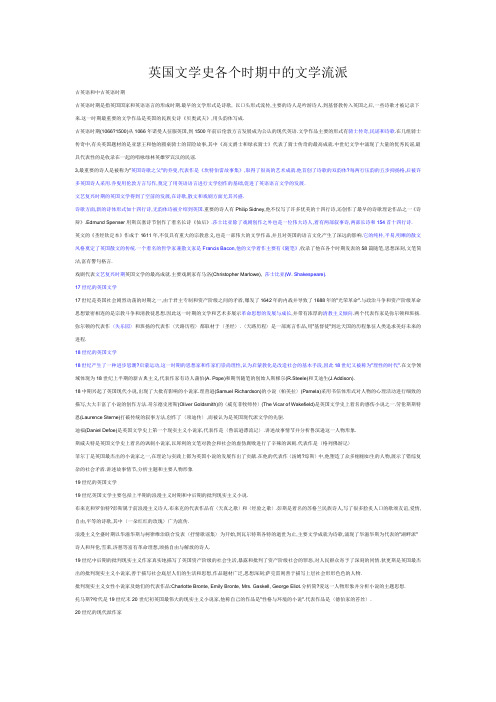
英国文学史各个时期中的文学流派古英语和中古英语时期古英语时期是指英国国家和英语语言的形成时期.最早的文学形式是诗歌, 以口头形式流传,主要的诗人是吟游诗人.到基督教传入英国之后,一些诗歌才被记录下来.这一时期最重要的文学作品是英国的民族史诗《贝奥武夫》,用头韵体写成.古英语时期(1066?1500)从1066年诺曼人征服英国,到1500年前后伦敦方言发展成为公认的现代英语.文学作品主要的形式有骑士传奇,民谣和诗歌.在几组骑士传奇中,有关英国题材的是亚瑟王和他的圆桌骑士的冒险故事,其中《高文爵士和绿衣骑士》代表了骑士传奇的最高成就.中世纪文学中涌现了大量的优秀民谣,最具代表性的是收录在一起的唱咏绿林英雄罗宾汉的民谣.3,最重要的诗人是被称为"英国诗歌之父"的乔叟,代表作是《坎特伯雷故事集》,取得了很高的艺术成就.他首创了诗歌的双韵体?每两行压韵的五步抑扬格,后被许多英国诗人采用.乔叟用伦敦方言写作,奠定了用英语语言进行文学创作的基础,促进了英语语言文学的发展.文艺复兴时期的英国文学得到了空前的发展,在诗歌,散文和戏剧方面尤其兴盛.诗歌方面,新的诗体形式如十四行诗,无韵体诗被介绍到英国.重要的诗人有Philip Sidney,他不仅写了许多优美的十四行诗,还创作了最早的诗歌理论作品之一《诗辩》.Edmund Spenser用斯宾塞诗节创作了着名长诗《仙后》.莎士比亚除了戏剧创作之外也是一位伟大诗人,着有两部叙事诗,两部长诗和154首十四行诗.英文的《圣经钦定本》作成于1611年,不仅具有重大的宗教意义,也是一部伟大的文学作品,并且对英国的语言文化产生了深远的影响.它的纯朴,平易,明晰的散文风格奠定了英国散文的传统.一个着名的哲学家兼散文家是Francis Bacon,他的文学着作主要有《随笔》,收录了他在各个时期发表的58篇随笔,思想深刻,文笔简洁,富有警句格言.戏剧代表文艺复兴时期英国文学的最高成就.主要戏剧家有马洛(Christopher Marlowe), 莎士比亚(W. Shakespeare).17世纪的英国文学17世纪是英国社会剧烈动荡的时期之一,由于君主专制和资产阶级之间的矛盾,爆发了1642年的内战并导致了1688年的"光荣革命".与政治斗争和资产阶级革命思想紧密相连的是宗教斗争和清教徒思想.因此这一时期的文学和艺术多展示革命思想的发展与成长,并带有浓厚的清教主义倾向.两个代表作家是弥尔顿和班扬.弥尔顿的代表作〈失乐园〉和班扬的代表作〈天路历程〉都取材于〈圣经〉.〈天路历程〉是一部寓言作品,用"基督徒"到达天国的历程象征人类追求美好未来的进程.18世纪的英国文学18世纪产生了一种进步思潮?启蒙运动,这一时期的思想家和作家们崇尚理性,认为启蒙教化是改造社会的基本手段,因此18世纪又被称为"理性的时代".在文学领域体现为18世纪上半期的新古典主义,代表作家有诗人蒲伯(A. Pope)和期刊随笔的创始人斯梯尔(R.Steele)和艾迪生(J.Addison).18中期兴起了英国现代小说,出现了大批有影响的小说家.理查逊(Samuel Richardson)的小说〈帕美拉〉(Pamela)采用书信体形式对人物的心理活动进行细致的描写,大大丰富了小说的创作方法.哥尔德史密斯(Oliver Goldsmith)的〈威克菲牧师传〉(The Vicar of Wakefield)是英国文学史上着名的感伤小说之一.劳伦斯斯特恩(Laurence Sterne)打破传统的叙事方法,创作了〈项迪传〉,而被认为是英国现代派文学的先驱.迪福(Daniel Defoe)是英国文学史上第一个现实主义小说家,代表作是〈鲁滨逊漂流记〉.讲述故事情节并分析鲁滨逊这一人物形象.斯威夫特是英国文学史上着名的讽刺小说家,以犀利的文笔对教会和社会的虚伪腐败进行了辛辣的讽刺.代表作是〈格列佛游记〉菲尔丁是英国最杰出的小说家之一,在理论与实践上都为英国小说的发展作出了贡献.在他的代表作〈汤姆?琼斯〉中,他塑造了众多栩栩如生的人物,展示了错综复杂的社会矛盾.讲述故事情节,分析主题和主要人物形象19世纪的英国文学19世纪英国文学主要包括上半期的浪漫主义时期和中后期的批判现实主义小说.布来克和罗伯特?彭斯属于前浪漫主义诗人.布来克的代表作品有〈天真之歌〉和〈经验之歌〉.彭斯是着名的苏格兰民族诗人,写了很多脍炙人口的歌颂友谊,爱情,自由,平等的诗歌,其中〈一朵红红的玫瑰〉广为流传.浪漫主义全盛时期以华滋华斯与柯律维治联合发表〈抒情歌谣集〉为开始,到瓦尔特斯各特的逝世为止,主要文学成就为诗歌,涌现了华滋华斯为代表的"湖畔派"诗人和拜伦,雪莱,济慈等富有革命理想,颂扬自由与解放的诗人.19世纪中后期的批判现实主义作家真实地描写了英国资产阶级的社会生活,暴露和批判了资产阶级社会的罪恶,对人民群众寄予了深刻的同情.狄更斯是英国最杰出的批判现实主义小说家,善于描写社会底层人们的生活和思想,作品题材广泛,思想深刻;萨克雷则善于描写上层社会形形色色的人物.批判现实主义女性小说家及她们的代表作品:Charlotte Bronte, Emily Bronte, Mrs. Gaskell, George Eliot.分析简?爱这一人物形象并分析小说的主题思想.托马斯?哈代是19世纪末20世纪初英国最伟大的现实主义小说家,他称自己的作品是"性格与环境的小说".代表作品是〈德伯家的苔丝〉.20世纪的现代派作家人们对西方文明的危机感和第二次世界大战的恶果促成了西方现代派文学的形成.主要表现为意识流小说,代表作家有詹姆斯乔伊斯和弗洁尼亚沃尔夫.乔伊斯的小说〈尤利西斯〉描写的是现代都市居民庸俗,猥琐的精神生活.弗洁尼亚的〈到灯塔去〉则运用了娴熟的象征手法和意识流技巧.英国文学发展史及每个阶段的特点毋庸置疑,英国小说是世界艺术之林中的一大景观。
01、古英语文学和中世纪文学
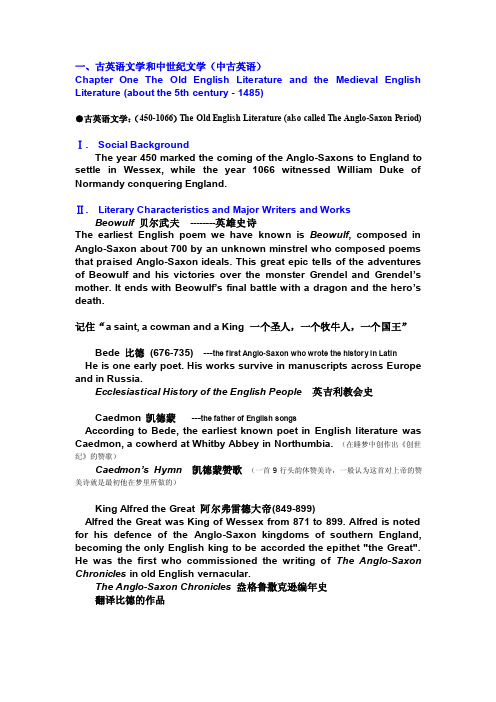
一、古英语文学和中世纪文学(中古英语)Chapter One The Old English Literature and the Medieval English Literature (about the 5th century - 1485)●古英语文学:(450-1066)The Old English Literature (also called The Anglo-Saxon Period)Ⅰ. Social BackgroundThe year 450 marked the coming of the Anglo-Saxons to England to settle in Wessex, while the year 1066 witnessed William Duke of Normandy conquering England.Ⅱ. Literary Characteristics and Major Writers and WorksBeowulf 贝尔武夫--------英雄史诗The earliest English poem we have known is Beowulf, composed in Anglo-Saxon about 700 by an unknown minstrel who composed poems that praised Anglo-Saxon ideals. This great epic tells of the adventures of Beowulf and his victories over the monster Grendel and Grendel’s mother. It ends with Beowulf’s final battle with a dragon and the hero’s death.记住“a saint, a cowman and a King 一个圣人,一个牧牛人,一个国王”Bede 比德(676-735) ---the first Anglo-Saxon who wrote the history in LatinHe is one early poet. His works survive in manuscripts across Europe and in Russia.Ecclesiastical History of the English People 英吉利教会史Caedmon 凯德蒙---the father of English songsAccording to Bede, the earliest known poet in English literature was Caedmon, a cowherd at Whitby Abbey in Northumbia. (在睡梦中创作出《创世纪》的赞歌)Caedmon’s Hymn 凯德蒙赞歌(一首9行头韵体赞美诗,一般认为这首对上帝的赞美诗就是最初他在梦里所做的)King Alfred the Great 阿尔弗雷德大帝(849-899)Alfred the Great was King of Wessex from 871 to 899. Alfred is noted for his defence of the Anglo-Saxon kingdoms of southern England, becoming the only English king to be accorded the epithet "the Great". He was the first who commissioned the writing of The Anglo-Saxon Chronicles in old English vernacular.The Anglo-Saxon Chronicles 盎格鲁撒克逊编年史翻译比德的作品●中世纪文学:(1066-1485)The Medieval English LiteratureⅠ. Social BackgroundMiddle English literature refers to the literature in the period from Norman Conquest to the end of the Wars of the Roses and the accession of Henry Ⅶ. The evolution of something new is most apparent in some of the developments in religious writing in Middle English literature. The literature was various and deeply influenced by French.Ⅱ. Literary Characteristics and Major Writers and WorksTwo main literature forms:Medieval Romance (浪漫传奇:原本指中世纪早期地中海沿岸西部地区的一种用诺曼语讲述的故事。
古英语时期英国文学
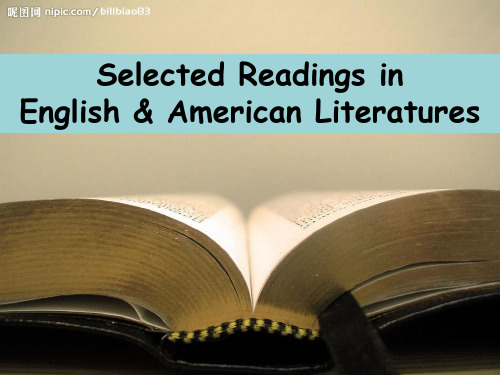
太阳神阿波罗& 爱与美之神阿佛罗狄忒
(维纳斯)
riod of Old English literature(古英语文学) extends from about 450 to 1066, the year of the Norman conquest of England. The Germanic tribes(日耳曼部落) from the Northern Europe brought with them not only the Anglo-Saxons language (the basis of Modern English), but also a specific poetic tradition, which is both bold and strong, mournful and elegiac in spirit. Old English poets produced the national epic poem(史诗), Beowulf, and a number of more or less lyrical poems(抒情诗) of shorter length, which do not contain specific Christian doctrines but evoke the Anglo-Saxons sense of the harshness of circumstance and the sadness of the human lot.
• • • •
•
阿波罗(Apollo): 宙斯和勒托之子,和阿耳忒 弥斯是双生兄妹;太阳神;全名为福玻斯·阿波罗( Phoebus Apollo)。 阿佛洛狄忒(Aphrodite): 爱,美和欲望之神 ;从海中的泡沫中生出。 赫尔墨斯(Hermes): 宙斯和迈亚之子;众神中 最快者;盗窃者的守护神,商业之神,黄泉的引导者 。 阿耳忒弥斯(Artemis): 宙斯和勒托之女,与 阿波罗是双生兄妹;美丽的女猎神和月神,青年人的 保护神。 赫淮斯托斯(Hephaestus): 宙斯与赫拉之子, 神中唯一丑陋者,但老婆却是爱与美之神阿佛洛狄忒 ;火和锻造之神,为众神制造武器和铠甲;铁匠和织 布工的保护神。
专八人文知识之英国文学
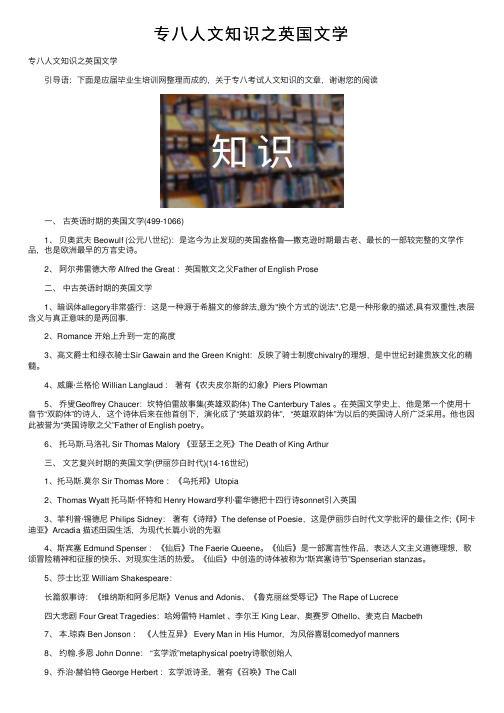
专⼋⼈⽂知识之英国⽂学专⼋⼈⽂知识之英国⽂学 引导语:下⾯是应届毕业⽣培训⽹整理⽽成的,关于专⼋考试⼈⽂知识的⽂章,谢谢您的阅读 ⼀、古英语时期的英国⽂学(499-1066) 1、贝奥武夫 Beowulf (公元⼋世纪):是迄今为⽌发现的英国盎格鲁—撒克逊时期最古⽼、最长的⼀部较完整的⽂学作品,也是欧洲最早的⽅⾔史诗。
2、阿尔弗雷德⼤帝 Alfred the Great :英国散⽂之⽗Father of English Prose ⼆、中古英语时期的英国⽂学 1、暗讽体allegory⾮常盛⾏:这是⼀种源于希腊⽂的修辞法,意为"换个⽅式的说法".它是⼀种形象的描述,具有双重性,表层含义与真正意味的是两回事. 2、Romance 开始上升到⼀定的⾼度 3、⾼⽂爵⼠和绿⾐骑⼠Sir Gawain and the Green Knight:反映了骑⼠制度chivalry的理想,是中世纪封建贵族⽂化的精髓。
4、威廉·兰格伦 Willian Langlaud :著有《农夫⽪尔斯的幻象》Piers Plowman 5、乔叟Geoffrey Chaucer:坎特伯雷故事集(英雄双韵体) The Canterbury Tales 。
在英国⽂学史上,他是第⼀个使⽤⼗⾳节“双韵体”的诗⼈,这个诗体后来在他⾸创下,演化成了“英雄双韵体”,“英雄双韵体”为以后的英国诗⼈所⼴泛采⽤。
他也因此被誉为“英国诗歌之⽗”Father of English poetry。
6、托马斯.马洛礼 Sir Thomas Malory 《亚瑟王之死》The Death of King Arthur 三、⽂艺复兴时期的英国⽂学(伊丽莎⽩时代)(14-16世纪) 1、托马斯.莫尔 Sir Thomas More :《乌托邦》Utopia 2、Thomas Wyatt 托马斯·怀特和 Henry Howard亨利·霍华德把⼗四⾏诗sonnet引⼊英国 3、菲利普·锡德尼 Philips Sidney:著有《诗辩》The defense of Poesie,这是伊丽莎⽩时代⽂学批评的最佳之作;《阿卡迪亚》Arcadia 描述⽥园⽣活,为现代长篇⼩说的先驱 4、斯宾塞 Edmund Spenser :《仙后》The Faerie Queene。
英语专八总复习系列:英国文学知识08
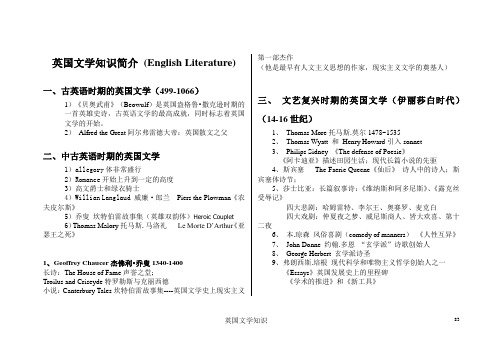
英国文学知识简介(English Literature)一、古英语时期的英国文学(499-1066)1)《贝奥武甫》(Beowulf)是英国盎格鲁•撒克逊时期的一首英雄史诗,古英语文学的最高成就,同时标志着英国文学的开始。
2)Alfred the Great阿尔弗雷德大帝:英国散文之父二、中古英语时期的英国文学1)allegory体非常盛行2)Romance开始上升到一定的高度3)高文爵士和绿衣骑士4)Willian Langlaud 威廉·郎兰Piers the Plowman《农夫皮尔斯》5)乔叟坎特伯雷故事集(英雄双韵体)Heroic Couplet6)Thomas Malory托马斯.马洛礼Le Morte D’Arthur《亚瑟王之死》1、Geoffrey Chaucer杰佛利•乔叟1340-1400长诗:The House of Fame声誉之堂;Troilus and Criseyde特罗勒斯与克丽西德小说:Canterbury Tales坎特伯雷故事集----英国文学史上现实主义第一部杰作(他是最早有人文主义思想的作家,现实主义文学的奠基人)三、文艺复兴时期的英国文学(伊丽莎白时代)(14-16世纪)1、Thomas More托马斯.莫尔1478~15352、Thomas Wyatt 和Henry Howard引入sonnet3、Philips Sidney 《The defense of Poesie》《阿卡迪亚》描述田园生活;现代长篇小说的先驱4、斯宾塞The Faerie Queene《仙后》诗人中的诗人;斯宾塞体诗节;5、莎士比亚:长篇叙事诗:《维纳斯和阿多尼斯》、《露克丝受辱记》四大悲剧:哈姆雷特、李尔王、奥赛罗、麦克白四大戏剧:仲夏夜之梦、威尼斯商人、皆大欢喜、第十二夜6、本.琼森风俗喜剧(comedy of manners)《人性互异》7、John Donne 约翰.多恩“玄学派”诗歌创始人8、George Herbert 玄学派诗圣9、弗朗西斯.培根现代科学和唯物主义哲学创始人之一《Essays》英国发展史上的里程碑《学术的推进》和《新工具》英国文学知识832、Edmund Spenser埃德蒙•斯宾塞1552~1599The Shepherds Calen dar牧人日历Amoretti爱情小唱Epithalamion婚后曲Colin Clouts Come Home Againe柯林•克劳特回来了Foure Hymnes四首赞美歌The Faerie Queene仙后3、Christopher Marlowe柯里斯托弗•马洛1564~1595Tamburlaine帖木耳大帝The Jew of Malta马耳他的犹太人The Tragical History of Doctor Faustus浮士德博士的悲剧4、William Shakespeare莎士比亚1564-1616The Tempest暴风风雨;The Two Gentlemen of V eronaz维罗纳二绅士;The Mercy Wives of Windsor温莎的风流妇人;Measure for Measure恶有恶报;The Comedy of Errors错中错;Much Ado about Nothing无事自扰;Love’s Labour’s Lost空爱一场;A Midsummer Night’s Dream仲夏夜之梦;The Merchant of V enice威尼斯商人;As Y ou Like It如愿;The Taming of the Shrew驯悍记;All’s Well That Ends Well皆大欢喜;Twelfth Night第十二夜;The Winter’s Tale冬天的故事;The Life and Death of King John/Richard the Second/Henry theFifth/Richard the Third约翰王/理查二世/亨利五世/理查三世;The First/Second Part of King Henry the Fourth亨利四世(上、下);The First/Second/Third Part of King Henry the Sixth亨利六世(上、中、下);The Life of King Henry the Eighth亨利八世;Troilus and Cressida脱爱勒斯与克莱西达;The Tragedy of Coriolanus考利欧雷诺斯;Titus Andronicus泰特斯•安庄尼克斯;Romeo and Julet罗密欧与朱丽叶;Timon of Athens雅典的泰门;The Life and Death of Julius Caesar;朱利阿斯•凯撒;The Tragedy of Macbeth麦克白;The Tragedy of Hamlet哈姆雷特/王子复仇记;King Lear李尔王;Othello奥塞罗;Antony and Cleopatra安东尼与克利欧佩特拉;Cymbeline辛白林;Pericles波里克利斯;V enus and Adonis维诺斯•阿都尼斯;Lucrece露克利斯;The Sonnets十四行诗英国文学知识845、Francis Bacon培根1561-1626Advancement of Learning学术的进展;Novum Organum新工具;New Atlantic新大西岛;Essays随笔(Of Studies论学习;Of Wisdom for a Man’s Self)四、启蒙时期(18世纪)1、约翰·弥尔顿:《失乐园》、《为英国人民争辩》2、约翰·班扬:《天路历程》religious allegory3、约翰·德莱顿:英国新古典主义的杰出代表、桂冠诗人;《论戏剧诗》4、亚历山大.蒲柏:英国新古典主义诗歌的重要代表;英雄双韵体的使用达到登峰造极的使用;《田园组诗》是其最早田园诗歌代表作5、托马斯·格雷:感伤主义中墓园诗派的代表人物《墓园挽歌》6、威廉·布莱克:天真之歌、经验之歌;7、罗伯特·彭斯:苏格兰最杰出的农民诗人;8、Richard Steel和Joseph Addison合作创办《The tatler》和《the spectator》9、Samuel defoe 英国现实主义小说的奠基人之一;《鲁滨逊漂流记》;《铲除非国教徒的捷径》,仪表达自己的不满;10、Jonathan Swift 《一个小小的建议》;《格列佛游记》;《桶的故事》;11、Samuel Richardson 英国现代小说的创始人;帕米拉;克拉丽莎;查尔斯.格蓝迪森爵士的历史;12、Henry Fielding 英国现实主义小说理论的奠基人;《约瑟夫。
- 1、下载文档前请自行甄别文档内容的完整性,平台不提供额外的编辑、内容补充、找答案等附加服务。
- 2、"仅部分预览"的文档,不可在线预览部分如存在完整性等问题,可反馈申请退款(可完整预览的文档不适用该条件!)。
- 3、如文档侵犯您的权益,请联系客服反馈,我们会尽快为您处理(人工客服工作时间:9:00-18:30)。
England was conquered by the Romans, the Anglo-Saxons, and the Normans.The latter two conquests much affected England.The Anglo-Saxons brought to England the Germanic language and culture, while the Normans brought a fresh wave of Mediterranean civilization. This civilization includes Greek culture, Roman law, and the Christian religion.The cultural influences of these two conquests provided the source for the rise and growth of English literature.England was conquered bythe Romans ( Julius Caesar invaded in 54 B.C.—75 A.D. the Emperor Claudius conquered; The Roman Wall of York; the Roman Empire in Britain collapsed by 410 A.D)the Anglo-Saxons (the year 449 as the starting point of Anglo-Saxon epoch; they stayed there and had the language )the Normans (On Christmas day 1066, William of Normandy became William I of England.)William IThe cultural influencesThe Anglo-Saxons broughtGermanic language and cultureThe Normans broughtMediterranean civilizationGreek cultureRoman lawChristian religionThe setting and the hero have nothing to do with England, for thestory took place in Scandinavia.The story describes Beowulf in fighting against the monster Grendel,his revengeful mother and a fire-breathing dragon.It is an example of the mingling of nature myths and heroic legends.Beowulf Beowulf, written in Old English sometimebefore the 10th century A.D., describes theadventures of a great Scandinavian warrior ofthe sixth century. A rich fabric of fact andfancy, Beowulf is the oldest surviving epic(史诗)in British literature.Characteristics of Anglo-Saxon LiteratureAnglo-Saxon literature did not begin with books, but with spoken verse and songs or poems such as epic poems. The purpose of these forms of literature was to pass along tribal history and values to a population who could not read or write. Warriors would gather in mead halls were scops and their assistants (gleemen) would recite poems or songs for hours or even days as a form of entertainment or ceremonial occasions. These poems were made very catchy so they could easily be recalled and thus retold. These poems surely consisted of the use of kennings, alliteration, and rhymes. Literature such as epic poems show the influence of Christianity and pagan beliefs such as the freedom of decision making and fate handling matters of life and death.11th-14th1. Geoffrey of Monmouth—“The History of the Kings of Britain”: King Arthur and his Round Table Knights; Lear; Cymbeline;.2. Roger Bacon: the father of experimental scientistAnglo- Norman (French) literature: romancesSocial satires in verseSecond half of 14th c“Of the Truth of the Holy Scriptures”:absolute authority of the Bible“Of Divine Dominion” & “OfCivilian Dominion”: clergy has noright to hold propertyJohn Gower①“Mirour de L’omme”(French):the mirror of mankind—sins of man②“Vox Clamantis”(Latin): thevoice of the clamant—the peasant’srising of 1381 (against)③“Confessio Amantis”( English):a lover’s confession—the seven deadly sins: pride, luxury, envy, wrath, avarice, gluttony and slothWilliam Langland“Piers the Plowman”:the vision ofPiers the Plowman ( two dreams)the vision of Do-wel, Do-bet,Do-bestGeoffrey Chaucer The Book of the Duchess”:original“Romanunt of the Rose”:translation from French, firstintroduced into English verse theoctosyllabic coupletEnglish literature of 15th centuryBallad: a story told in song, usually in 4-line stanzas, with second and fourth lines rhymed.Characteristics of Middle-age Literature基调、流派更加丰富多彩。
2.民间通俗文学在这个时期占据了重要位置。
它为读者准确而生动地展示了当时人们的各种生活,尽管其创作思想有失新颖。
3.中世纪文学还大量反映了中世纪基督教的教义原则(mediaval Christain doctrine),这些教义都与人类(personal salvation)自救有关。
(1.In comparison with Old English literature, Middle English literature deals with a wider range of subjects, is uttered by more voices and in a greater diversity of styles, tones and genres. 2. Popular folk leterature also occupies an important place in this period.Its presentation of life not only accurate but also lively and colourful, though the originality of thought is often absent in literary works of this period. 3. Besides, Middle English literature strongly reflects the principles of the medieval Christian doctrine, which were primarily of concerned with the issue of personal salvation.)。
